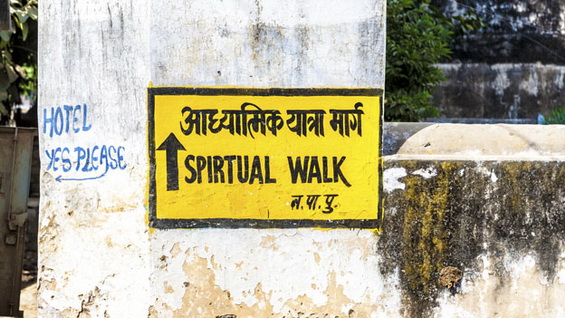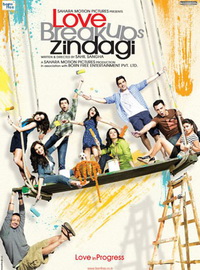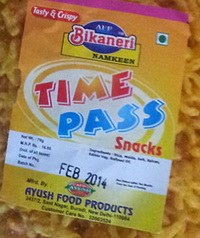Published by the BBC, Craig Jeffrey writes on June 30, 2014:

Anyone who travels beyond Delhi and Mumbai to India’s provincial cities will notice English words cropping up increasingly in Hindi conversation. While some of these terms fell out of use in the UK decades ago, others are familiar, but used in bold new ways.
Picture the scene. I’m chatting to a young man named Yuvraj Singh. He’s a college student in the Indian city of Dehra Dun. We’re talking in Hindi. But every so often there’s an English word. It’s Hindi, Hindi, Hindi, and then suddenly an English word or phrase is dropped in: “job”, “love story” or “adjust”.
What should we make of this? It’s not that Hindi lacks equivalent words. He could have said the Hindi “kaam” instead of “job”. Why mention the English words? And what’s Yuvraj speaking? Is it Hindi, English, an amalgam “Hinglish”, or something else?
In 1886 Henry Yule and Arthur Burnell published Hobson-Jobson, a guide to words from Indian languages that had passed into English.
You can search through it for references to the origins of words such as “shampoo” and “bungalow”. But now many Indian citizens are using English words in the course of talking Hindi – or Tamil, or Bengali, etcetera.
Sometimes you hear English swear words where you would least expect them.
There are some good reasons for the explosion of English words. They are sometimes badges of honour in a society intent on becoming modern. Even if you don’t speak English fluently, you might be able to use the odd word to impress your neighbour.
I was travelling on a train out of Delhi once and a young girl dropped her ice cream on the carriage floor. Her mother turned round and reminded her of what she evidently thought was an appropriate English word: “Say ‘shit!’ Say ‘shit’!” she said strictly. You won’t hear that on the 08:15 to Paddington.
Some of the words now used in Hindi have fallen out of use in the UK. I was on a bus that broke down in a remote part of India recently and everyone starting screaming about the “Stepney”. I had no idea at the time, but they remonstrated angrily, “Of course you know! It’s an English word!” I later found out that “Stepney” means “spare tyre” – from a Welsh firm that made tyres in the 1910s. Some college students refer to their second girlfriend as their “Stepney”, and now that makes sense too.
There is also a genre of military words now used a lot in India. People buy “rations” and a one-day stop-off on a journey somewhere else is a “night halt.”
 Bollywood is also behind this Englishisation. A whole range of terms and words used in urban India can be traced back to fashionable films. Recent releases include “Shaadi ke side effects” (marriage’s side effects), “Love, breakups, zindagi” (love, breakups, life) and “Main Tera Hero” (I am your hero).
Bollywood is also behind this Englishisation. A whole range of terms and words used in urban India can be traced back to fashionable films. Recent releases include “Shaadi ke side effects” (marriage’s side effects), “Love, breakups, zindagi” (love, breakups, life) and “Main Tera Hero” (I am your hero).
The rapid growth in mobile phone ownership is another cause. “Miss call” has become a popular verb, as in “I will miss call my friend.” This is done by phoning someone and ringing off quickly before he or she has time to answer. It lets the person know that you are thinking of them.
People are highly inventive. Take the word “tension.” This is used as a noun (“don’t give me tension”), verb (“don’t tension me”), and adjective (“that was a very tension exam”).
There are also many neologisms emerging in India. “Timepass” means passing time. “What are you doing?” I’ve asked college-going friends in India. “Kuch nahin, bas timepass” (“Nothing, just timepass”) comes the flat reply. Youth boredom is such a problem in large parts of provincial north India that young people refer to their whole lives as “timepass.”
The art of timepass:
- Craig Jeffrey, professor of Development Geography at Oxford University, is author of Timepass: Youth, Class, and the Politics of Waiting in India
- He was inspired to write it by the large numbers of lower-middle-class college students waiting at the tea stall in the northern city of Meerut
- He wrote: “These men spend much of their day in what they called ‘timepass’ (passing time). As one young man put it: ‘Time has no value in India. We are just passing the time: hoping something better is round the corner.'”
They are terrorised by a seeming over-abundance of featureless, monotonous time. “What is there to do nowadays?” many of my student friends ask rhetorically. “Only timepass.”
 Peanut sellers at railway stations also shout “timepass” as they hawk their wares up and down station platforms. Shelling and eating peanuts is a good way to break the tedium of long journeys. A company (called Britannia Industries ironically) has developed a series of salty snacks called “Timepass” that play on the same idea.
Peanut sellers at railway stations also shout “timepass” as they hawk their wares up and down station platforms. Shelling and eating peanuts is a good way to break the tedium of long journeys. A company (called Britannia Industries ironically) has developed a series of salty snacks called “Timepass” that play on the same idea.
There are rhyming phrases, too. I have been told not to approach the Indian police with a complaint unless I have “back and jack.” “Back” means “backing.” You need a social connection with a local politician if you’re going to deal with the Indian police. “Jack” means leverage (as in “car jack”), because you also need some point of influence – a bribe, or muscle power.
Everyday appropriations of English words are always highly expressive. “Hinglish” is the wrong term. People aren’t just mixing words. They are creatively, actively, energetically reinventing them.
In 2006 a leading underwear manufacturer in India, launched a new brand of “VIP” underpants and its entire marketing campaign was based around the humble English word “adjust.”
The television ad for the pants begins with a man sitting on a milepost waiting for a bus. Another man walks up and asks the first man to “adjust” slightly, so that he can share the seat. We also see people squeezing into a tiny space on a train, a man barging his way to the front of a queue for cinema tickets, and people clambering onto the roof of a bus.
A voiceover cuts in: “How often in life do we have to adjust?” It asks in Hindi, but using the English word “adjust”. “But with our underwear it is different. The fit is so great, there is no need to adjust.”
The final punchline is that VIP are India’s first “hands-free underpants”. Men no longer have to adjust their crotches in public, because the underpants fit so well.
From hanging out on street corners to “hands-free underpants”, English is resurgent in India.
Related article: Peep, Peep, Dont Sleep





Comments are closed.